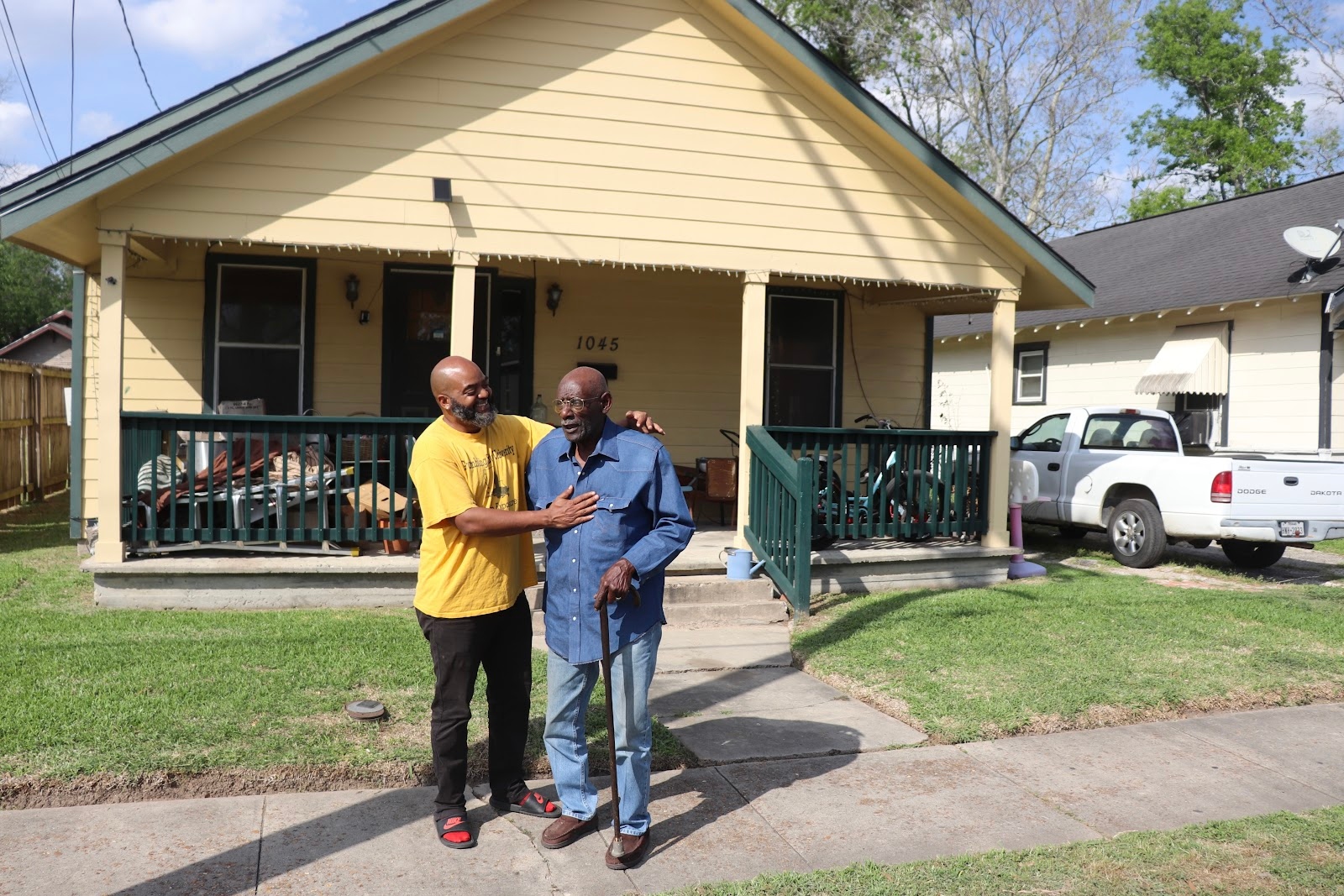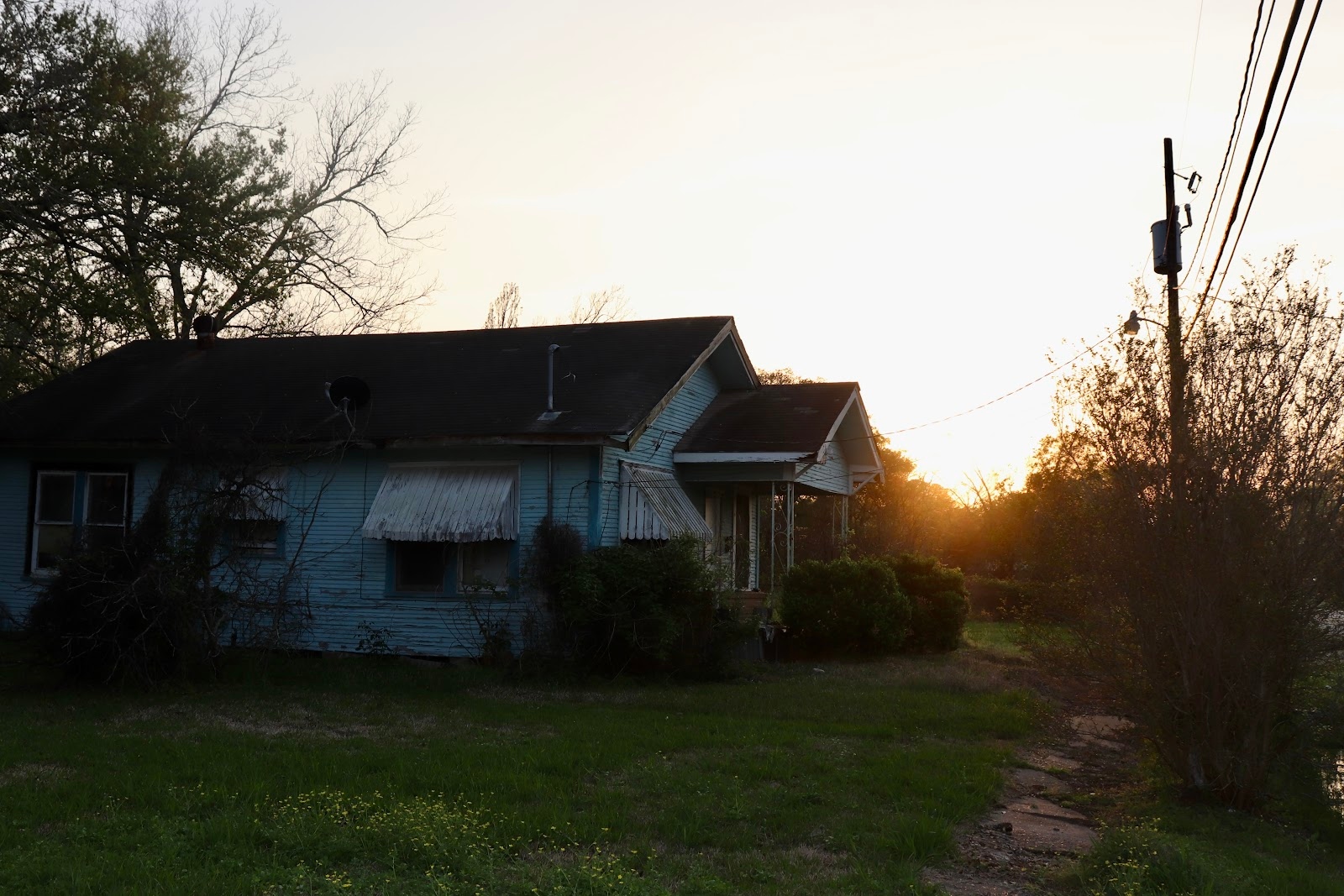This story was originally published by Capital B and is republished with permission.
When Tara Bettis is at her home in Beaumont, Texas, the 57-year-old doesn’t need a clock to know what time it is. Her body instinctively knows based on the pitches of whistles and bells ringing from her neighbor’s property: a massive, land-gobbling oil refinery and chemical plant owned by ExxonMobil.
“Everybody knows the whistles — the ones in the morning, the one that lets you know it’s 12 o’clock,” said Bettis, mimicking the sound, bellowing out a resounding “whooo-whooo.”
“But you never want to hear one blow in the evening, past five or six or seven — especially late, late at nighttime,” she explained. “They blow those whistles then, that means there was an explosion.”
The bells, smells, and fires lighting the midnight sky from her neighbor are only expected to become more of a nuisance for her and her 82-year-old mother, daughter, and two grandchildren. In February, the plant completed a $2 billion expansion — the biggest project in the U.S. in over a decade. The 68 percent refining capacity increase makes the plant’s production capabilities the seventh-largest in the world.
Despite a historic focus on environmental injustices by the Biden administration, ExxonMobil leaders last year cited his administration’s calls for the country’s oil companies to ramp up production as one of the motivators behind completing the project. A recent forecast by the Energy Information Administration found that petrochemical projects ushered in during the first two years of Biden’s administration will not allow the country to reach a 50 percent drop in domestic greenhouse gas emissions from 2005 levels by 2030 as once targeted by the administration.
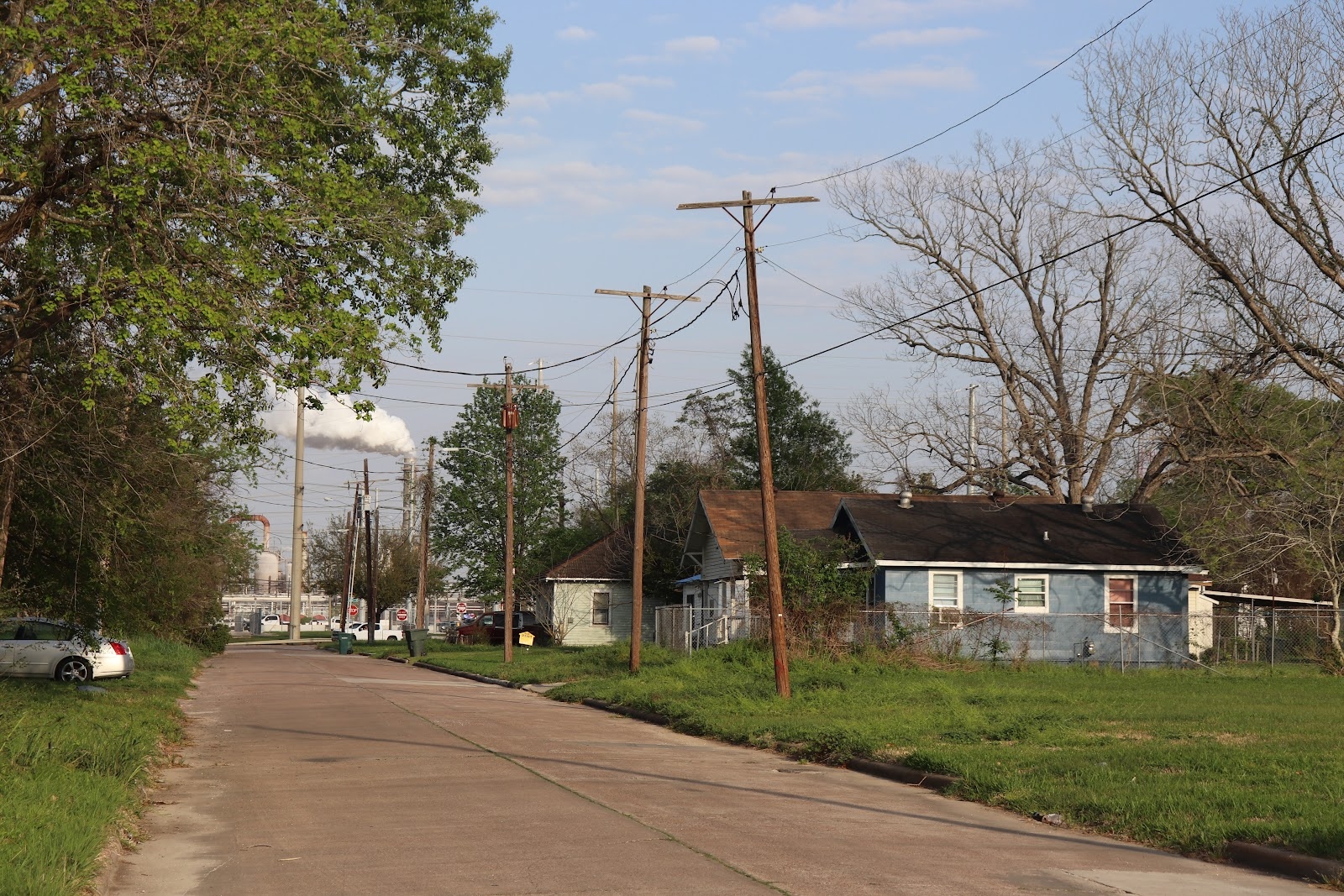
Adam Mahoney/Capital B
The irony underscores decades-old circumstances that have worked to engorge and disappear Black communities across the country. Beaumont is one of the first Black strongholds in Texas. Oil helped attract Black residents to the city in the early 20th century, ushering in a new level of economic stability, but now it’s left a majority-Black community captured under its reign.
Bettis has lived through a handful of explosions in her lifetime, but feels “blessed” they’ve never blown her neighborhood, Charlton-Pollard, away. The neighborhood is 95 percent Black, while the total one-mile buffer around ExxonMobil is about 75 percent Black.
She’s been scared of the refinery since her family first moved to her home when she was just three years old. She’s seen the refinery’s reach grow exponentially; watched the company buyout, demolish, and then build on top of the homes of her childhood friends; contaminate the river where she and her family spent Sundays crabbing and where the city gets a share of its drinking water; and has seen nothing substantial come from two civil rights complaints brought by residents to the federal government.
“Growing up here when all those houses were still here, we had the best time,” she said while sitting on the porch of her newly built home. She still lives on the same lot she grew up on, but hurricane damage recently required her family to knock down the original property and erect a new one.
“But oh my gosh, I’ve always been scared. When I was coming up as a teenager, they used to let off a smell that would actually knock me out,” she said.
She fears that her lifelong exposure to pollution may potentially lead to future health complications for her and maybe even her grandchildren. Air pollution and toxins can live in your body for years, leading to serious health effects: One-third of deaths from stroke, lung cancer, and heart disease are due to air pollution.
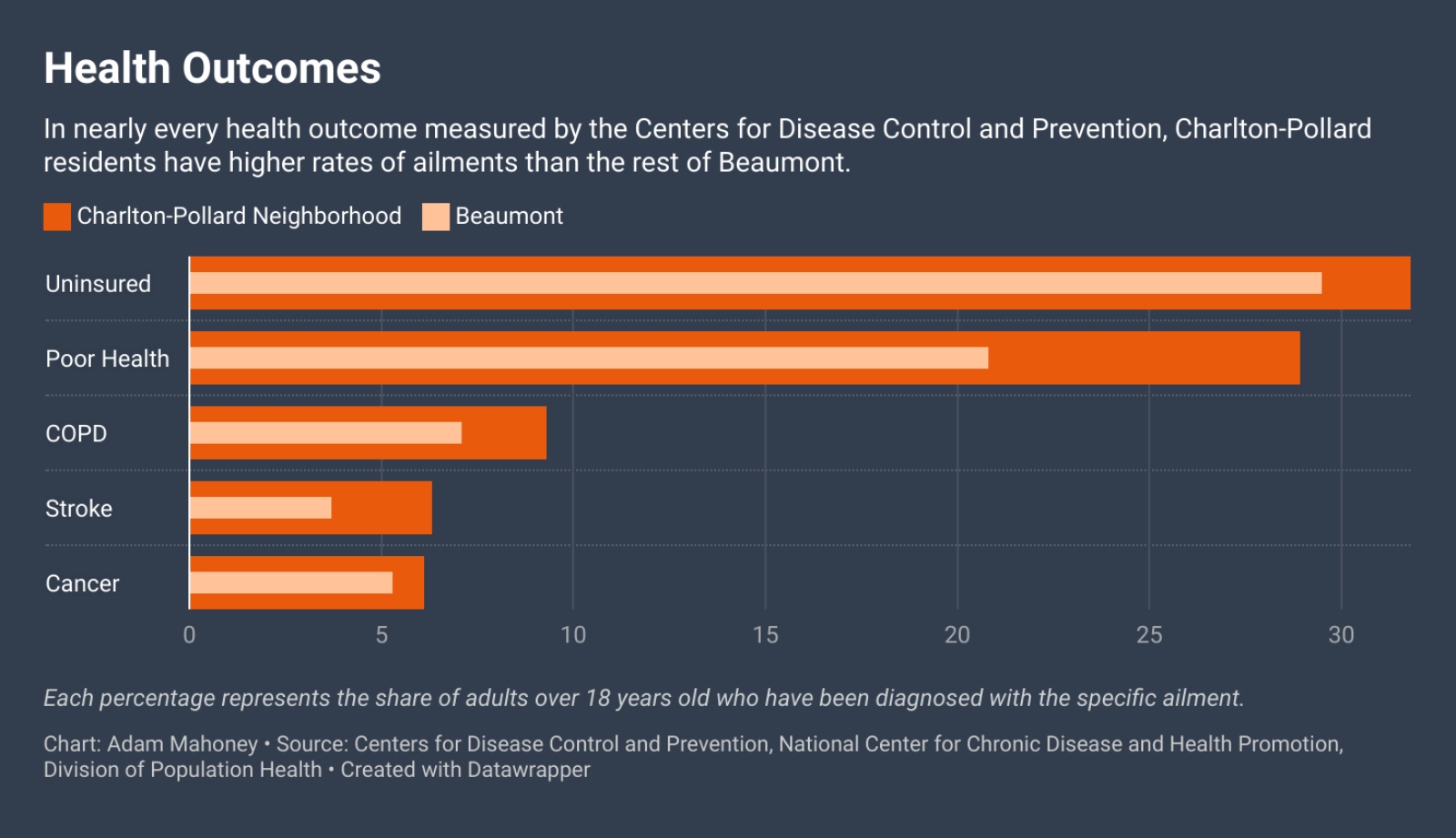
Despite no one in her household being a smoker, she and her parents all developed chronic obstructive pulmonary disease, a severe illness that damages the lungs and makes breathing difficult. Residents in her neighborhood are diagnosed with COPD at a rate twice as high as the U.S. average, according to the Centers for Disease Control and Prevention.
“We truly live our life in hazard,” she said, but her father, proud of the home he built for his family, vowed to never sell.
‘Why do you want to up and kill us?’
Even before the expansion, the 120-year-old, 2,700-acre refinery was routinely one of the world’s largest polluters. Since 2000, ExxonMobil’s Beaumont operations have dumped more than 500 million pounds of pollution into the air. In 2020, the plant’s air pollution was its highest in 14 years, despite a global consensus about the ways pollution may exacerbate the severity of COVID-19 infections. The rise in toxins reversed years of progress resulting from an Environmental Protection Agency lawsuit against the plant in 2005 that led to a consent decree and fine.
And since 2010, the plant has been responsible for 70 million tons of greenhouse gas emissions, roughly the equivalent of the total emissions of 2 million Americans over that same time. In total, 14 industrial sites within Beaumont’s city limits have released 200.2 million tons of greenhouse gas emissions over that time.
The emissions, in no small part, help drive the increasing severity of storms that hit the area, including Hurricane Harvey, which damaged hundreds of Beaumont homes in 2017. Four feet of water inundated the city, as residents went without drinking water and electricity for days, and the ExxonMobil refinery dumped more than 10,000 pounds of unpermitted pollution in the air.
Chris Jones, president of the Charlton-Pollard neighborhood association, describes the area as an industrial horseshoe; on one side of the neighborhood is the Port of Beaumont; on the other is ExxonMobil, the city’s power plant, and the largest hydrogen storage facility in the world; and on the last adjacent side sits a railway, which carries petroleum and other toxic chemicals. Crisscrossing throughout the neighborhood, under homes and churches, is a significant network of gas pipelines.
It’s one of just two neighborhoods in Texas that the state’s environmental agency has noted for simultaneously having unsafe levels of the cancer-causing chemicals of benzene, hydrogen sulfide, and sulfur dioxide. Subsequently, residents in the Charlton-Pollard neighborhood are 15 percent more likely to receive a cancer diagnosis than other Beaumont residents and 45 percent more likely to have a stroke in their lifetime. The neighborhood’s excess lifetime cancer risk from air pollution is 390 percent higher than the EPA’s acceptable risk.
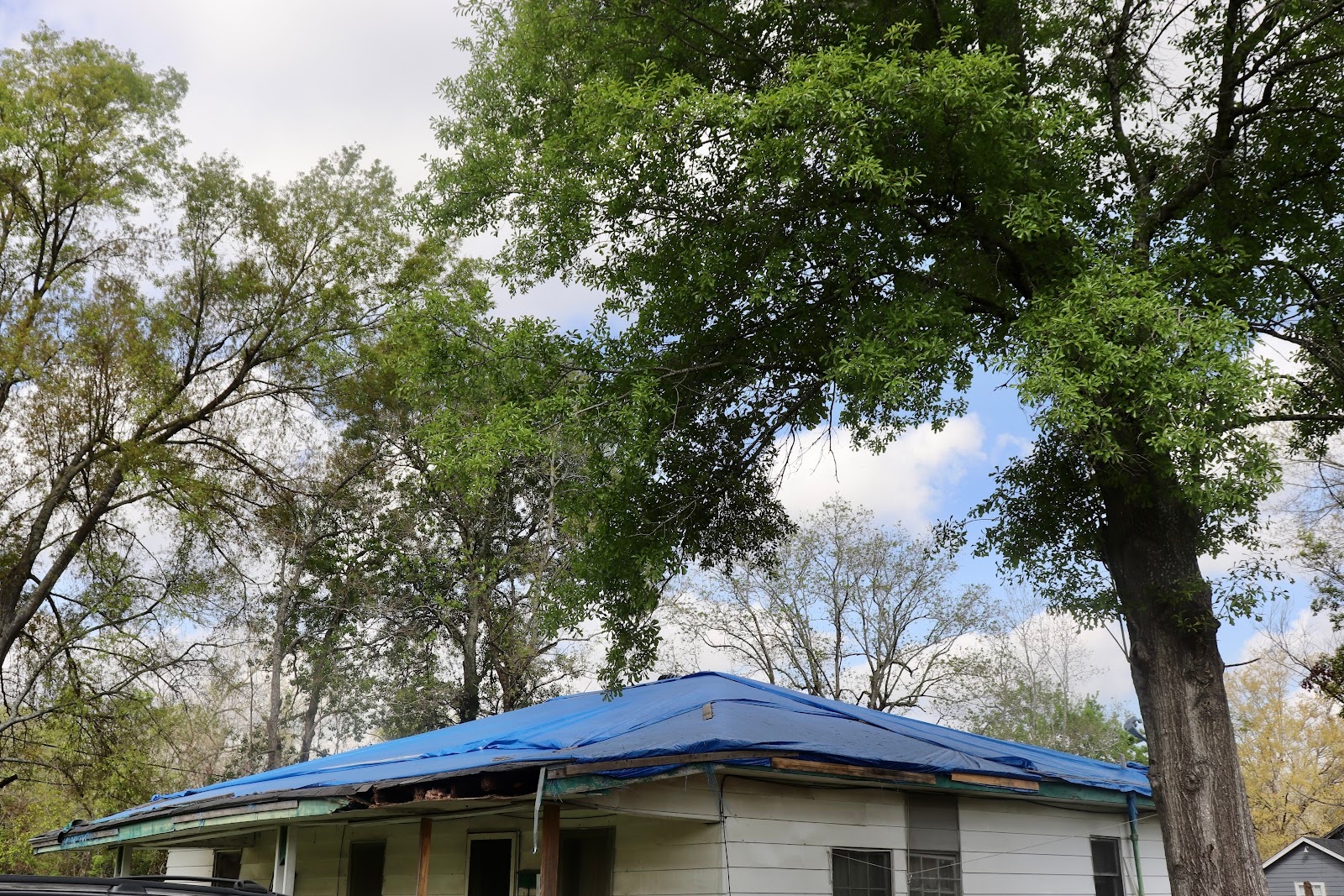
Adam Mahoney/Capital B
In more ways than one, Charlton-Pollard residents are trapped — by those health outcomes and the racism, poverty, industrial actors, and severe weather events that compound them. While the industrial companies around them make billions, one-third of Charlton-Pollard residents live in poverty.
“The city and these companies want to make this whole area industrial; it’s been that way since I was a young man,” said Jasper Jones, Chris’ father and a former worker at the ExxonMobil refinery. “I don’t want to speak against industry in this country, but it’s the public that supports these industries and the ones they’re making money off of.”
“So why do you want to up and kill us [with this pollution]?” he said, sitting with two neighbors on a humid March day. “I’ve watched all the Caucasians [in Beaumont] get the chance to get up and go, but this predominantly Black neighborhood is left here abandoned as people in their 30s and 40s have strokes and die from cancer.”
A community erased and neglected
The U.S. oil industry grew out of Beaumont. The city’s Spindletop oil field, discovered in 1901, was the world’s largest for decades. It helped solidify a trillion-dollar industry and accelerated America’s stronghold over the global economy.
The booming industry attracted Black families escaping poverty and sharecropping throughout the U.S. South. In Beaumont, they found a semblance of stability, the opportunity to work toward owning a home, and a job that paid well. A community blossomed, lined with churches, schools, grocery stores, and a club that regularly attracted the likes of James Brown. But most of the community’s amenities have been gone for at least three decades, Chris Jones says.
When the city’s population peaked in 1960, the city was two-thirds white. But in the years since, Black residents have become the majority. Over the past 60 years, spurred by white flight, the Beaumont area has lost thousands of residents and become the state’s slowest growing area as Texas’ population has grown by 200 percent.
“We can’t just point fingers at ExxonMobil because it’s not the only industrial entity encroaching on this historical Black neighborhood,” said Chris Jones, who estimates that in the past three decades, the Port of Beaumont, ExxonMobil, and other local industrial companies have bought out at least 100 lots, paying as little as $11,000 for certain properties. The diminished population, he says, has made collective organizing around the inequalities underpinning his community nearly impossible.
“It’s the elected and appointed officials that have neglected this area and decreased property values to make it attractive to large industries. It’s [Texas’s environmental agency] for letting us consume contaminated water and breathe polluted air. It’s the banks and insurance companies.”
“The erasure and neglect is intentional,” he said, “and we’re losing our lineage with it.”
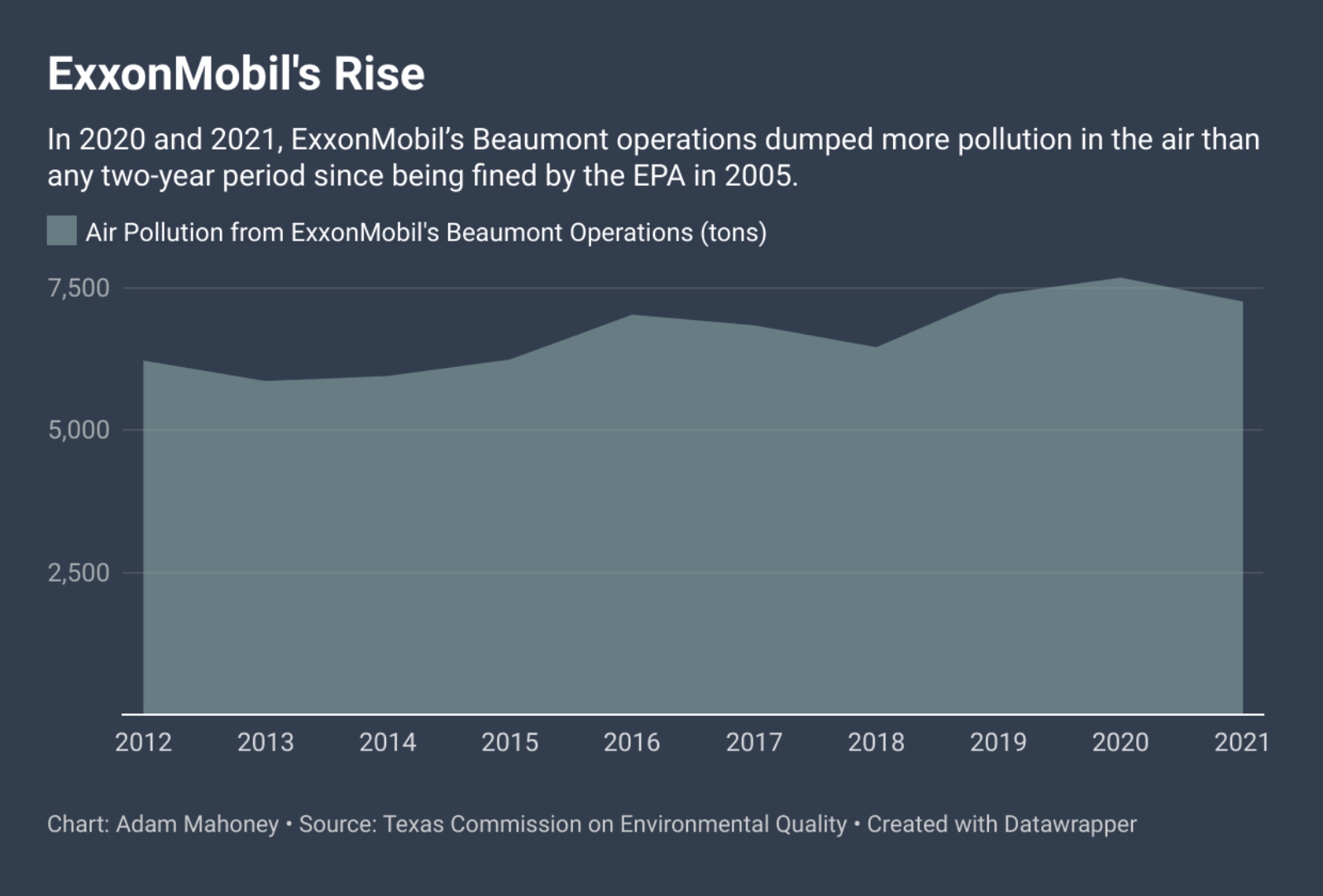
The decision to leave isn’t so simple
Jobs at plants in the community used to be accessible to under-educated workers. Not anymore, as many full-time petrochemical jobs require a college degree and have become increasingly digital.
While the energy industry is still the largest employer, residents say Black representation in the plants has dwindled. Today, Black workers in the oil and chemical plants surrounding Beaumont are much more likely to be contract employees than full-time workers, thus not receiving the stability of regular pay and the protections from constant physical health threats.
At ExxonMobil in Beaumont, 60 percent of workers are contract employees. In 2021, 650 Beaumont plant workers participated in the largest oil worker strike in four decades. While the union secured a 2 percent to 3 percent annual raise guarantee, it could not reverse a practice that allows the company to unilaterally alter or eliminate benefits, including pensions, health plans, and disability.
The battle highlighted the oil and chemical industry’s constantly expanding reach in Beaumont, influencing nearly every facet of daily life, from which streets get paved roads and streetlights to how long residents are expected to live; Black residents in the city have a life expectancy that is roughly eight years shorter than the average Texan.
There are only two ways to escape, residents say; you have flood or wind insurance and a hurricane floods your house or sends a tree crashing through your roof; or one of the area’s many industrial companies decides they want to expand and offers to buy you out of your land. But many residents don’t have insurance because they’ve lived in these homesteads for generations, meaning they’ve owned their homes long before certain mortgages required insurance.
On the left: Chris Jones and his father, Jasper Jones, stand outside their home, which sits two blocks from the ExxonMobil refinery. On the right: A single house sits on an otherwise-abandoned street next to the ExxonMobil refinery. Photos by Adam Mahoney for Capital B.
And home property values, diminished by the industrial horseshoe, make a payout worth little to nothing in the grand scheme. Nearly 70 percent of homes in the neighborhood are worth less than $80,000 compared to less than 12 percent of homes across the country.
The conundrum behind leaving lingers on the mind of many in the neighborhood, especially because these houses are their homes where generations of their families have lived.
On a weekday morning in March, Joseph Lartigue stood outside tinkering with his truck as a string of blue tarp tucked around his roof swayed with the breeze, a product of damage from Hurricane Harvey six years ago. Despite the long-lasting damage, the regular train bells that wake him up at 4 a.m., and the constant smell of “cat litter” from the refinery, Lartigue has no desire to leave.
“A lot of people around me have died out or left their house and moved away, but I’m not gonna leave. I’m gonna build a new house, and I’m gonna stay here,” said Lartigue, whose neighbor, his first cousin, passed away from cancer as a “young man.”
Lartigue has a special place in his heart for Beaumont. Migrating there from Louisiana in 1984, he was searching for well-paying jobs that didn’t exist back home, and he found one at a local hospital. In the end, he says, it’s about being practical about his options and the livability of the rest of the country. “[Beaumont] is not the place it was 30 years ago, but there are positives and negatives in every community,” he said, “but land everywhere has gotten to [be] so expensive.”
So some landowners have decided to hold on to their land, regardless of whether a hurricane or wear and tear required them to knock down their homes. Almost every day, Bettis says, a group of four to five men set up a card table and hang out on an empty lot they own across the street from her house. “They won’t ever sell their property to [Exxon]Mobil because they saw people didn’t get paid what they were supposed to get paid,” she explained. “So every day they get together over there, and they play dominoes and cards and have a good time.”
That reverence for remaining in the community fits the “mood of the neighborhood,” said Donald Ray Berry, a 64-year-old Beaumont native who worked as a contractor for the plant for 27 years. “We’re laid back. We don’t need a bunch of activity,” he said. “We’re blessed to have a home. I don’t really worry about if the power goes off or about a stinky smell. We’re old school. We got generators. I know how to close and raise a window and how to turn on a fan.”
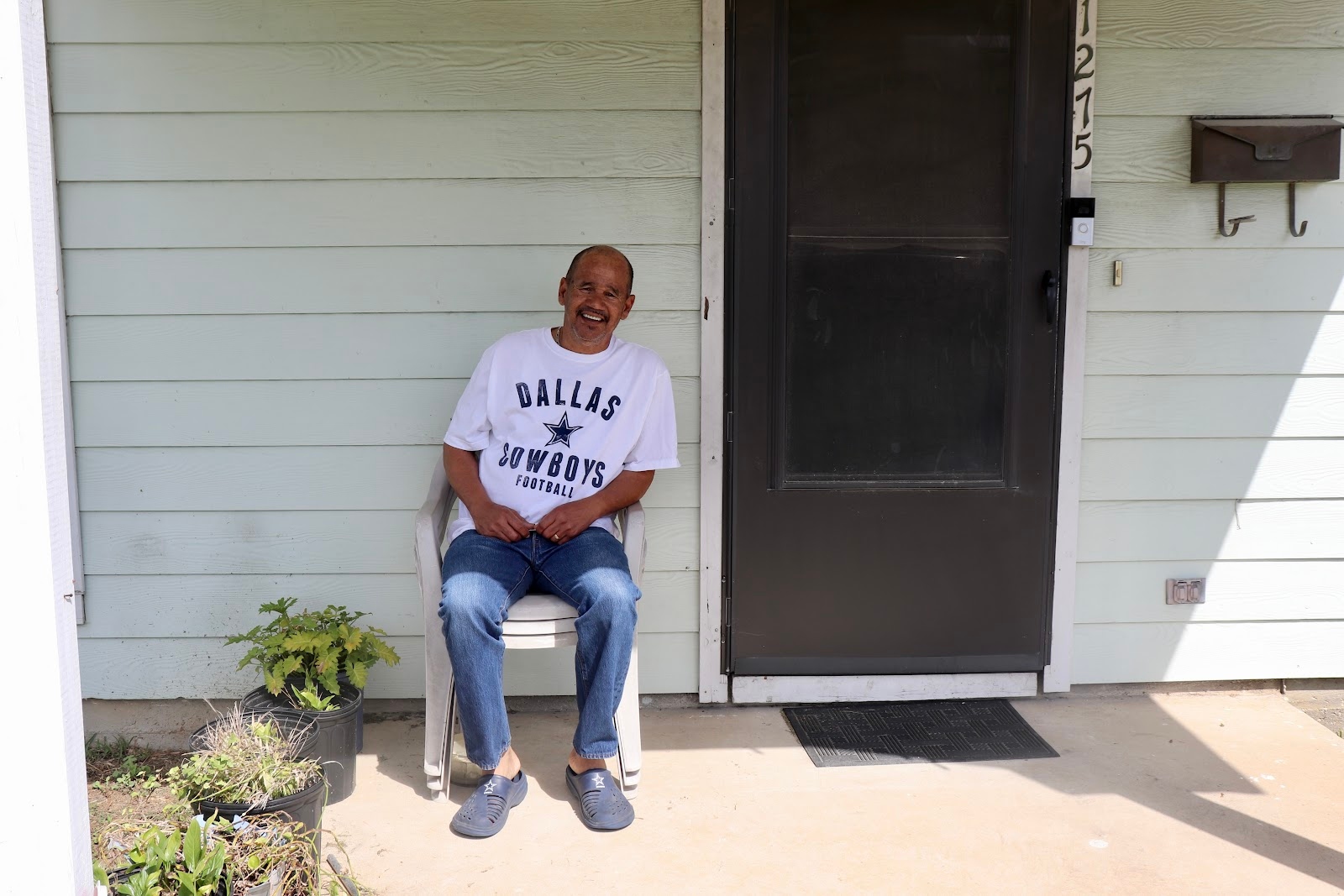
Adam Mahoney/Capital B
Since Veronica Leslie moved into her new home last year, she spends every morning on her porch enjoying a cup of coffee as smoke stacks rise above her. She didn’t move far, just 20 yards or so from the original home she lived in for nearly 50 years, which is now an empty lot owned by ExxonMobil. Hurricane Harvey’s wind crumbled the wood structure like it was a piece of paper, she said. She decided, with the city’s support, to build her new home on the empty lot next door because she could only afford to rebuild a home in the neighborhood with the money she received from a state recovery program.
Leslie raised her children in the neighborhood, but the now-retired woman would gladly leave — if someone would buy her property. When ExxonMobil bought out dozens of properties in the neighborhood in the early 2000s, Leslie says the company “jumped over” her and “went and got the houses next door.”
I don’t know why God left me here,” said the 72-year-old, who believes she could only afford to live in a mobile home if she was able to sell her property.
Understanding that there isn’t going to be a savior coming in to buy her home, Leslie turns her attention to making it as livable as possible. “I’ve been blessed, even with [ExxonMobil] sitting right under my nose. I grew up here, my parents lived and worked here,” she said. “It’ll continue to be home.”
The history of the community deserves preservation, Jones says as he gave a tour of some of the community’s last-standing landmarks, including a 155-year-old African Methodist Episcopal Church, one of the region’s first Black founded religious institutions. As he rode down a street with just one property left standing, the former site of a day care center, Jones stomped on the brakes as he passed the lot before he reversed and jumped out of the car.
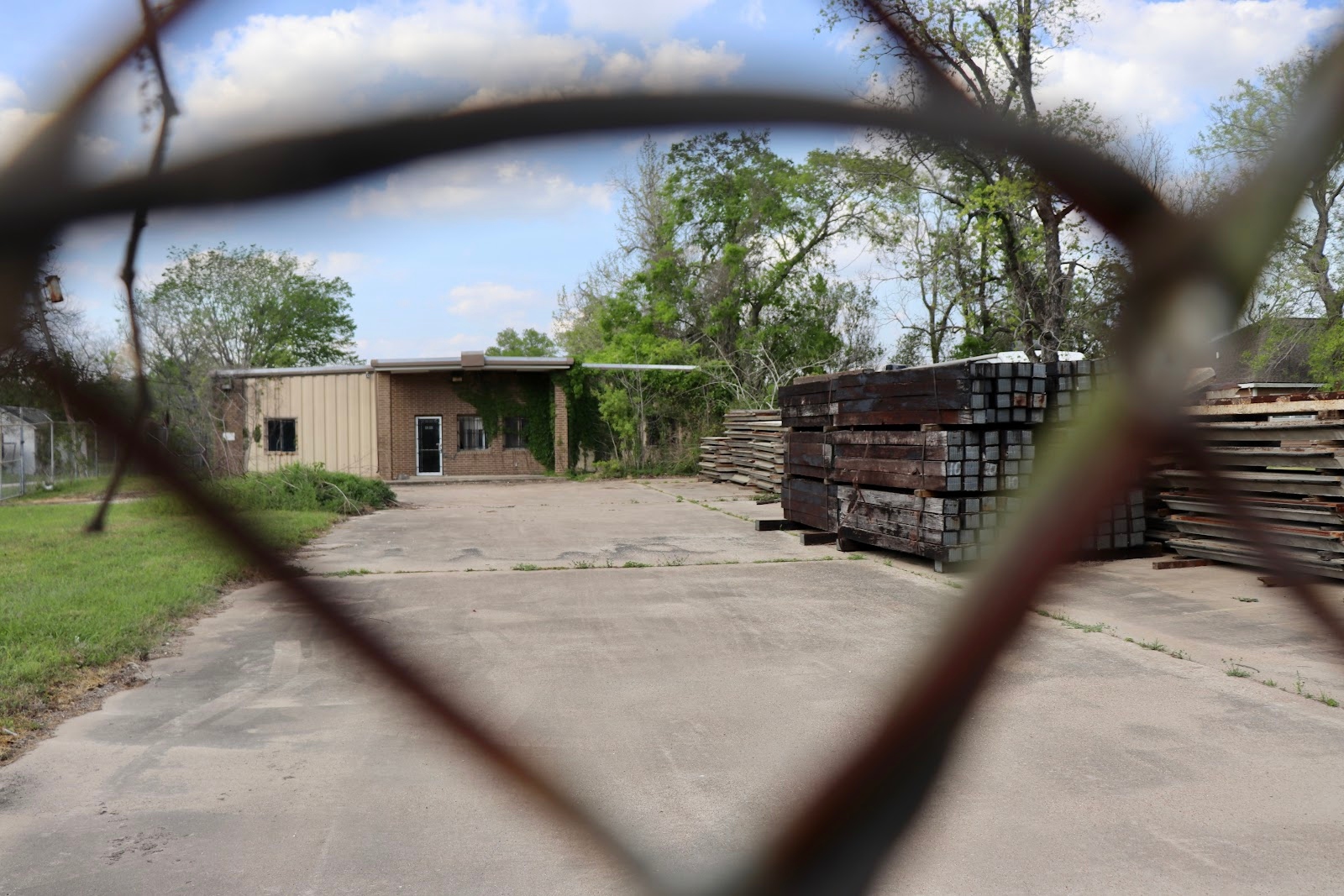
Adam Mahoney/Capital B
“You see this, or am I tripping?” he yelled. A stack of rail tracks sat uncovered on the property now owned by the Port of Beaumont. Tears swelled in his eyes as he mumbled about the potential carcinogens and herbicides they may have been sprayed with.
“Another battle to fight.”


